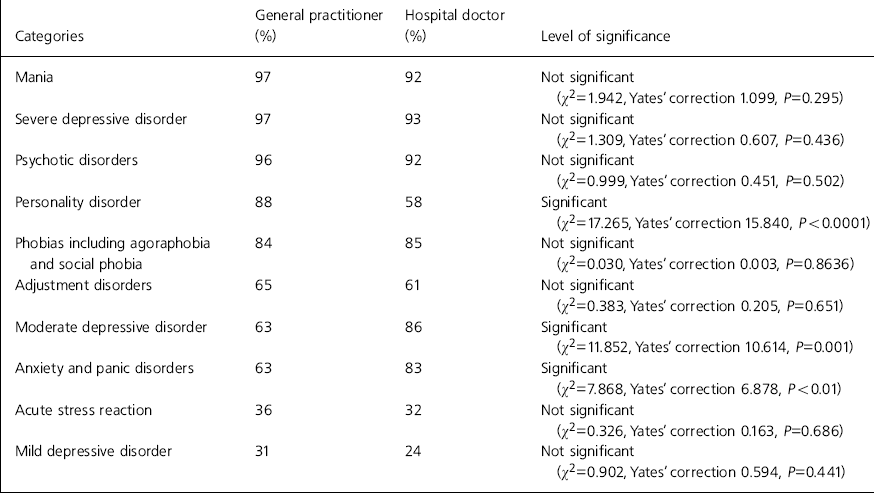The National Service Framework for Mental Health emphasises the need to prioritise services for those with severe and enduring mental illness (Department of Health, 1999). However, disappointingly little guidance has been given as to whom this group comprises. This has done little to resolve the confusion over which individuals should be referred to community mental health teams (CMHTs). The expectations of society have become unrealistic, as responsibility is often inappropriately placed on the medical profession. This has led to traditional boundaries of psychiatric disorder being broadened as everyday problems have been medicalised (Reference DoubleDouble, 2002). This has been further reinforced by the ICD-10 (World Health Organization, 1992), which includes every possible category in its classification, many of which do not require intervention from psychiatric services. Clinical experience shows that there is a great variability with which patients are referred by general practitioners (GPs) and are accepted for treatment by CMHTs. There are few data on who should be treated by CMHTs. Hence a study was undertaken to evaluate the attitudes of GPs and psychiatrists regarding who they believed needed referral to CMHTs.
Method
A questionnaire was designed based on ICD-10 definitions (World Health Organization, 1992) of ten common psychiatric disorders (Table 1). A description of the symptoms and signs was given for each. (A full version of the questionnaire is available on request.) Participants were asked whether they felt an individual with each disorder would need referral to a CMHT.
Table 1. Percentage of psychiatrists and general practitioners who agreed referral for each disorder was appropriate

| Categories | General practitioner (%) | Hospital doctor (%) | Level of significance |
|---|---|---|---|
| Mania | 97 | 92 | Not significant (χ2=1.942, Yates' correction 1.099, P=0.295) |
| Severe depressive disorder | 97 | 93 | Not significant (χ2=1.309, Yates' correction 0.607, P=0.436) |
| Psychotic disorders | 96 | 92 | Not significant (χ2=0.999, Yates' correction 0.451, P=0.502) |
| Personality disorder | 88 | 58 | Significant (χ2=17.265, Yates' correction 15.840, P<0.0001) |
| Phobias including agoraphobia and social phobia | 84 | 85 | Not significant (χ2=0.030, Yates' correction 0.003, P=0.8636) |
| Adjustment disorders | 65 | 61 | Not significant (χ2=0.383, Yates' correction 0.205, P=0.651) |
| Moderate depressive disorder | 63 | 86 | Significant (χ2=11.852, Yates' correction 10.614, P=0.001) |
| Anxiety and panic disorders | 63 | 83 | Significant (χ2=7.868, Yates' correction 6.878, P<0.01) |
| Acute stress reaction | 36 | 32 | Not significant (χ2=0.326, Yates' correction 0.163, P=0.686) |
| Mild depressive disorder | 31 | 24 | Not significant (χ2=0.902, Yates' correction 0.594, P=0.441) |
Questionnaires were posted to every fourth GP on the Solihull and Birmingham GP lists (n=212) and to all general adult psychiatrists (consultants, training grade doctors and non-consultant career grade doctors) in this area (n=114). The response rate was 49%. Results were analysed using the χ2 test with Yates’ correction. A cutoff point of ≥80% in both groups was considered to denote concordance between the groups.
Results
Results are summarised in Table 1. There was a high degree of concordance between psychiatrists and GPs for referral of individuals with psychotic disorders, mania, severe depressive disorder and phobias.
GPs were significantly more likely than psychiatrists to refer patients with personality disorder to CMHTs. Psychiatrists were significantly more likely than GPs to believe that individuals with moderate depressive disorder and anxiety and panic disorder should be referred to CMHTs.
Overall, there were similarities in referral patterns when consultants were compared with junior doctors in psychiatry, except for personality disorders where junior doctors were significantly more likely to consider referral appropriate.
Interestingly, within each professional group there was a considerable degree of disagreement about whether referral was appropriate for several disorders. For example, among the psychiatrists, 58% felt that an individual with personality disorder should be referred, whereas 42% felt they should not. Among GPs, 63% would refer individuals with moderate depressive disorders and anxiety and panic disorders, whereas 37% would not.
Discussion
Unsurprisingly there is little controversy over the appropriate management of the more severe forms of mental illness. Both groups agreed that patients with severe depressive disorders, phobias, psychotic disorders and mania should be referred to CMHTs. However, there was a substantial ‘grey area’, comprising acute stress reactions, mild depressive disorder, moderate depressive disorder, adjustment disorder, personality disorder and anxiety and panic disorder, where there was disagreement both between and within groups about appropriate management. The reasons for these differing views are beyond the scope of this paper.
These findings reflect enormous variability in current clinical practice, both in who is referred by GPs and in the acceptance by CMHTs. This leads to uncertainty among both the patients and the clinicians, which needs to be resolved. We would advocate that the Royal Colleges of Psychiatrists and General Practitioners carry out further research in this area and develop guidance as to which patients should be referred to mental health services.
Declaration of interest
None.




eLetters
No eLetters have been published for this article.